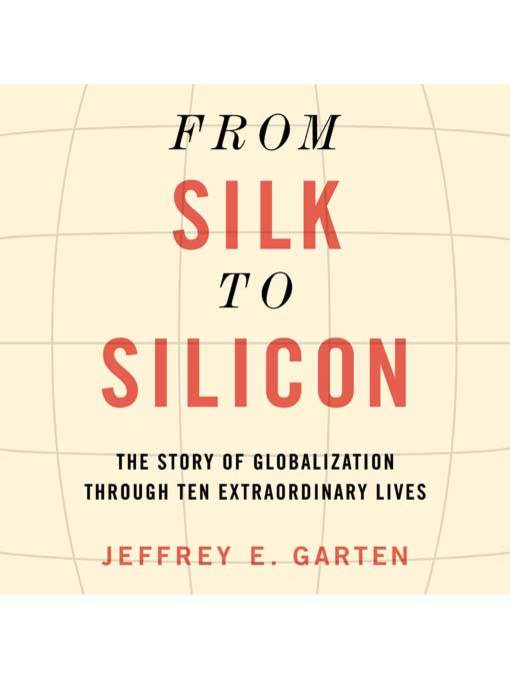
From Silk to Silicon
The Story of Globalization Through Ten Extraordinary Lives
کتاب های مرتبط
- اطلاعات
- نقد و بررسی
- دیدگاه کاربران
نقد و بررسی

January 11, 2016
In this wide-ranging book, Garten (The Politics of Fortune), former dean of the Yale School of Management, identifies 10 transformational individuals who laid the foundation for modern globalization. He begins with Genghis Khan, who conquered and united the vast Mongol Empire, and moves chronologically as he profiles Prince Henry of Portugal, whose fearless naval expeditions set in motion the Age of Exploration; Robert Clive, the merchant-soldier who laid the basis for the British Empire; Mayer Amschel Rothschild, whose dealings represented the beginnings of global financial markets; Cyrus Field, layer of the first transatlantic telegraph cable, which set the stage for modern telecommunications; John D. Rockefeller, the businessman whose companies anticipated today’s multinational corporations; Jean Monnet, who coordinated the establishment of the European Union; Margaret Thatcher, the free-market evangelist who linked Britain’s economy with the world’s; Andrew Grove, the manager who made Intel a leader in the microprocessor industry; and Deng Xiaoping, the modernizing Chinese leader whose market reforms brought hundreds of millions of people into the global economy. Garten recognizes each figure’s unique skills and qualities as well as their evils. It’s an unapologetically neoliberal take on history, but Garten is correct that each contribution reverberates in the present. Maps and illus. Agent: James Levine, Levine Greenberg Rostan Literary Agency.

History buffs will love the political intrigue and sweeping sagas that fill this engrossing audio. Tom Perkins narrates with unobtrusive consistency, resonating with the drama woven into the narratives and putting to good use his pleasing vocal tone and sensitivity to phrasing. Starting with the thirteenth-century illiterate empire builder Genghis Khan, who created organizational structures that elevated his rowdy warriors by incorporating the skills and cultures of conquered lands, the author profiles leaders throughout the ages whose explorations capitalized on the rich diversity they found in civilizations across the globe. The perspective Garten offers, illustrated with captivating personal narratives, provides a timely reminder not only that all civilizations and cultures have value but that the disruption caused by today's rapidly shrinking world is not new and is not altogether bad. T.W. © AudioFile 2016, Portland, Maine

May 1, 2016
What do Genghis Khan, Prince Henry the Navigator, Robert Clive, Mayer Rothschild, Cyrus Field, John D. Rockefeller, Jean Monnet, Margaret Thatcher, Andy Grove, and Deng Xiaoping have in common? As presented in Garten's book, these individuals played important roles in bringing the world together through globalization. They did this through imperialism and colonial administration (Khan and Clive), advancements in technology and communications (Prince Henry and Field), finance (Rothschild and Monnet), business (Rockefeller and Grove), and politics (Thatcher and Deng). While emphasizing the positive parts they played in worldwide economic and cultural development, Garten includes discussion of the negative aspects of globalization, providing the listener with a lively introduction to a select group of people who helped shape the modern world. Tom Perkins does an excellent job in telling their stories. VERDICT This thoughtful audiobook is recommended to all listeners interested in economics and world events. ["This highly approachable book, clearly written and intriguing in concept, will be valuable in telling the story of globalization as the relationships between person and theme are well drawn and illuminating": LJ 2/1/16 review of the Harper hc.]--Stephen L. Hupp, West Virginia Univ. Parkersburg Lib.
Copyright 2016 Library Journal, LLC Used with permission.

























دیدگاه کاربران